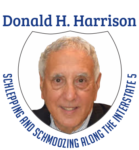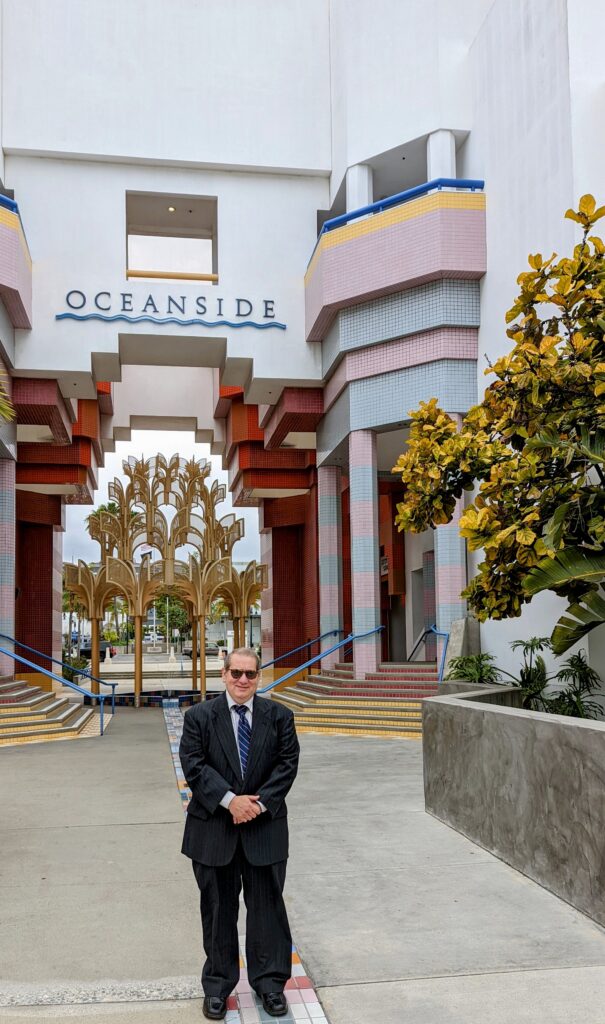 Editor’s Note: This is the 26th chapter in Volume 3 of Publisher and Editor Donald H. Harrison’s 2022 trilogy, “Schlepping and Schmoozing Along the Interstate 5.” All three books as well as others written by Harrison may be purchased from Amazon.com
Editor’s Note: This is the 26th chapter in Volume 3 of Publisher and Editor Donald H. Harrison’s 2022 trilogy, “Schlepping and Schmoozing Along the Interstate 5.” All three books as well as others written by Harrison may be purchased from Amazon.com
Schlepping and Schmoozing Along the Interstate 5, Volume 3, Exit 53 (Mission Avenue): Oceanside City Hall.
From northbound Interstate 5, take the Mission Avenue offramp and follow signs for Mission Avenue. Turn right on N. Home Street, then left onto Pier View Way. Turn right onto N. Ditmar Street and turn left to 300 N. Coast Highway, Oceanside.
 OCEANSIDE, California — Four areas of interest have shaped the life of Cantor Larry Kornit of Congregation Beth Tikvah: Religion, music, politics, and sports. In addition to serving as a spiritual leader of what he described as his Conservative/ Reform/ Eclectic congregation, he also has volunteered as a member of the City of Oceanside’s nine-member Housing Commission. The commission meets in the City Council chambers the fourth Tuesday of each month.
OCEANSIDE, California — Four areas of interest have shaped the life of Cantor Larry Kornit of Congregation Beth Tikvah: Religion, music, politics, and sports. In addition to serving as a spiritual leader of what he described as his Conservative/ Reform/ Eclectic congregation, he also has volunteered as a member of the City of Oceanside’s nine-member Housing Commission. The commission meets in the City Council chambers the fourth Tuesday of each month.
Kornit grew up a “literal stone’s throw” from Chicago in the suburb of Lincolnwood, Illinois. He was the only child of Sherry (Berson) Kornit and Harvey Kornit. His mother was a speech therapist and a schoolteacher who sang in the Jewish People’s Choir and spoke fluent Yiddish and English. His father was a cab driver who had lost approximately 80 percent of his hearing from childhood scarlet fever. “I think that attests to the fact of why I speak rather loudly,” Kornit told me during a May 2020 interview.
His paternal grandfather immigrated from Ukraine and worked as a lithographer, but never had much money owing to his addiction to gambling. His maternal grandfather spoke eight languages, which he utilized while trying to get factory workers to join the Amalgamated Workers Union. He was so effective, textile factory owners blackballed him.
The Kornit family worshipped at A.G. (Austrian Galicia) Beth Israel, an Orthodox congregation in Chicago, where young Larry was inspired by Cantor Morton Pliskin, “one of my first teachers and one of my most important mentors.” Cantor Pliskin’s voice “was sweet like honey; mine had a little more heft to it.” Pliskin taught Kornit niggun (songs without words) and urged his parents not to push him, as Pliskin’s parents did, into becoming a child prodigy. “That’s what happened to him, and he hated it,” Kornit said.
The future cantor became adept at singing the National Anthem – performing it at graduation ceremonies for several of the colleges at Northern Illinois University, including his own. Graduating in 1983 with a bachelor’s degree in communications, he interned in that field at Loyola University, eventually settling into the computer field. Kornit’s love of music saw him following his mother into the Jewish People’s Choir and also regularly singing “The Star-Spangled Banner” at Chicago Bulls basketball games and Chicago Cubs baseball games.
He also became active in Democratic politics. At the age of nine or ten, he volunteered in the campaign of U.S. Representative Abner Mikvah, D-Illinois, and his first job out of college was to serve as an intern for U.S. Senator Paul Simon, D-Illinois. On one occasion, Simon triple checked some statistics that Kornit had developed, explaining “once they come out of my mouth, they don’t belong to you.”
At one Bulls game in 1986, against the Los Angeles Lakers, the visiting team’s executive took note of the singing “fat kid with the beard” and telephone Chicago’s ABC television affiliate to find out who he was. That prompted the station to post a clip of a Kornit performance on the afternoon news, surprising Kornit who happened to be watching TV while waiting at Sears for his car to be fixed. Arriving home, he learned that his father had been transported with a heart attack to Rush University Medical Center. At the hospital, his mother told Kornit to call the TV station and thank the sportscaster for the nice story. When he did so, sportscaster Ted Weigel learned in conversation that Kornit’s father was in the hospital. He did a little story about that on the 10 pm. news and the station sent a giant bouquet of flowers to the hospital. That pleased Kornit’s father no end. It also prompted relatives to ask why they had to find out on TV, rather from the family directly, that the older Kornit was hospitalized!
Kornit had other brushes with celebrity. Sportswriter Bob Greene wrote Hang Time, a book about Bulls’ star Michael Jordan in which he commented that in Los Angeles they have Placido Domingo and in Chicago they have a chunky, earnest computer technician. Kornit was less than thrilled with the description, but Greene later told Kornit that he had missed the point. He was illustrating the fact that Chicago, unlike Los Angeles, is all about working-class people. Kornit joked that it took him years of therapy to get over it.
The cantor reflected that “Some of the things I loved” included “being able to get Bulls’ tickets, when you couldn’t get them and being able to shake hands with Michael Jordan every night.”
While working as a “computer nerd,” Kornit also served as a cantorial soloist at Temple Israel in Valparaiso, Indiana, about 55 miles southeast of Chicago. It was experience that would serve him well years later after he moved to San Diego County,
After his father died, there was a community dinner to honor his legacy. Kornit had met Lauren Rubin, a hairdresser, through mutual friends but he fell in love with her after she volunteered to come to his mother’s home, who was then suffering the aftereffects of chemotherapy for the breast cancer that eventually killed her. Prior to the dinner, Lauren styled Sherry Kornit’s sparse hair, bringing along equipment and “trashy magazines,” so it felt like a real salon. “That’s when I knew this was the woman I wanted to marry,” said Kornit.” Their wedding was on June 23, 1991.
Nine years later, the couple moved to Oceanside, California, to be near two cousins on his father’s side who were like sisters to Kornit, who had grown up as an only child. “The move was easy because I was working for the phone company, which was out here too,” Kornit said. Within a few months after their arrival, he attended services at Congregation B’nai Tikvah. He was called to the Torah for an Aliyah. After congregants heard him chant the blessings, they asked if he would be willing to serve as the Conservative congregation’s cantor. He agreed and also soloed on two recordings with the San Diego Jewish Men’s Choir.
Having no children of their own, the Kornits doted on the children of his cousins Alissa (Levins) Rose and Marci Levins. Alissa’s daughter is Hadar Zamah Swerdlow, and Marci’s daughters are Sapir Ohayon and Maya Ohayon.
With a special place in his heart for Holocaust Survivors, Kornit described one of his most moving experiences as chanting some familiar Hebrew prayers in a production at San Diego State University of To Be Certain of the Dawn by Stephen Paulus. “It was commissioned by a priest whose sister had married a Holocaust Survivor and wanted the world through music to know what had happened.”
If Congregation B’nai Tikvah would have a motto, it would be “that’s how we roll,” Kornit said. “We have a Hebrew school with director Naomi Gabai-Fisher and an incredible nucleus of perhaps 50 to 55 members. We are small, so affording a building is not something we can do. Because I have a computer background, it makes our Zoom services incredibly easy. We actually share the siddur (prayer book) and the Torah portion on the screen. We are able to do interactive things such as slide and film presentations. We had to adjust.”
The congregation holds Zoom services every Friday night and Saturday morning. Members get together physically for special occasions such as the Conservative Movement’s Worldwide Wrap when everyone – men and women – don tefillin (phylacteries) together. “If there is a bar or bat mitzvah, some we have done remotely but others we have done at people’s homes where we can bring the Torah and the Shulchan (reader’s table), and they turn out lovely,” Kornit said.
“We have learned to roll with the punches,” he added. “Because of our ability to be technically astute, we have been able to use this as an opportunity to look at what we can do and how we can survive.”
Prior to the COVID-19 pandemic, Congregation B’nai Tikvah shared space with Holy Cross Episcopal Church. But by the time of our May 2022 interview, the church was renting elsewhere, and B’nai Tikvah was looking for another venue. Their relationship was warm, Kornit said. “Pastor Laura Sheridan Campbell, who has since move to Medford, Oregon, is one of the sweetest human beings that I ever met. She was so embracing of having a synagogue to be part of their house. And we were embracing of her.” In 2005, when the first night of Chanukah and Christmas fell on the same day, the two congregations held an interfaith service.
Kornit expressed concern about the fate of Jewish synagogues. “If you look at the statistics, the amount of cantors graduating is decreasing,” he said. “Rabbis are not graduating, and synagogues are dying on the vine. It is sad.”
Although it is small, B’nai Tikvah is bucking the trend, Kornit said. “We are incredibly welcoming to mixed couples and families, to the LGBTQ community, and to everything and anything because our philosophy is that Judaism has said ‘no’ way too much. I’ve gotten into discussions with Chabad rabbis who say, ‘Well we have to have standards.’ I said, ‘Who said that congregants have to be Jewish? Where in the Torah does it say that? We believe that we need to be an open, honest, and inclusive place where people feel welcomed and honored.”

The cantor said that he makes it a point not to talk about politics within his congregation, but outside he is involved both in civic activities and partisan politics.
He was among eleven candidates who ran for an Oceanside City Council seat in 2018, placing in the middle of the pack. He advocated building housing units within transportation corridors and attempting to resolve the homeless situation within his city.
“They live here, they are part of our community, and they should not be looked at as second or third class,” Kornit said. In 2019, Oceanside’s then mayor Peter Weiss appointed him to the nine-member city Housing Commission.
As a commissioner, Kornit has advocated applying for federal and state funds to provide wrap-around services “for those who are able to come off the streets.” The goal is to transition people to temporary housing, perhaps utilizing Section 8 subsidies offered to low-income families by the federal Department of Housing and Development or benefits from the Veterans Administration. However, “people don’t realize that there is an eight-year wait to get a Section 8 voucher – eight years!” Kornit exclaimed. “The saddest part of all is that most of our homeless are senior citizens. If you are now on a wait list for Section 8 housing and you are a senior who is not getting proper medical care, or can’t sustain three square meals a day, ad who is suffering from the extreme heat and cold that you sometimes find, then those eight years are not going to come easily, if at all. This is a problem that is not going to go away, but it is one we cannot turn our heads from.”
Homelessness, he added, is also an environmental issue because “the people are living outside and do not have the facilities by which they can maintain proper hygiene.” He said even getting a handle on the extent of the homeless problem in Oceanside is difficult, although he estimates that there are upward of 250 unhoused people in the city. He said it may take as many as six contacts with a homeless person before that person will consider changing his or her circumstances and “you never know if you are contacting someone the second or third time. Interfaith communities are doing a great job of trying to help our homeless community, but we need more.”
He favors city efforts to locate social, medical, and dental services for the homeless. “We are building a temporary shelter for homeless individuals,” he said. “We have done a certain amount of voucher work so they can get into some housing. But that is temporary. The question is how do you do it permanently? We are looking at ADUs—adjoining dwelling units—that people can put into their backyards, outside of their homes, but on their property.”
In addition to his civic work, Kornit has been involved in organizing an advocacy group called Democrats for Peace in the Middle East. “I am incredibly hopeful that there can be either a two-state or three-state solution (to the Israel-Palestinian conflict),” he said. “Having conversations with people who agree with you does not change anything, so we must have open and honest and direct conversations with those who don’t. We have put together a slide presentation about the history of the Middle East. People do not realize that Jews have been in the Middle East since 2000 BCE.”
He also has been involved in a political action committee, San Diegans Against Hate. “We are a nonpartisan, San Diego County-based political action committee with a local emphasis,” he explained. “We support school board and city council candidates and mayors who do not espouse hateful ideology and work to defeat those who do. Antisemitism is palpable and it is painful. We have the responsibility to speak up against hate whenever and wherever we find it. To not do so is to be complicit. I feel the same way about hate against Palestinians, hate against Muslims, hate against Christians, hate against Asians, hate against any racial group, but specifically hate against Jews … The silence of the Jewish community is deafening. It amazes me how people can stay quiet.”
*
Donald H. Harrison is publisher and editor of San Diego Jewish World. He may be contacted via donald.harrison@sdjewishworld.com